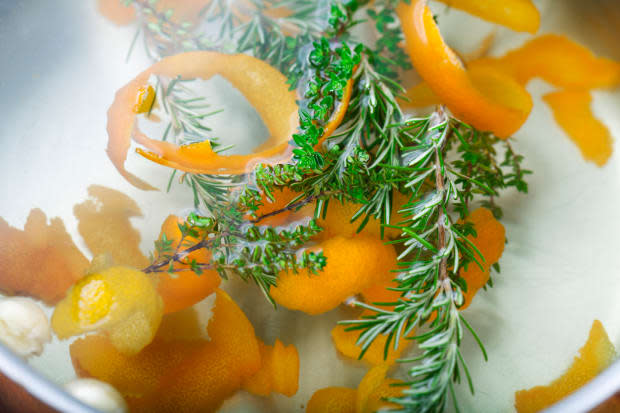How to Brine a Turkey Like a Pro
If you're looking to serve up a juicy, flavorful bird for Thanksgiving, you'll want to learn how to brine a turkey in advance.
Taking on the turkey this year? If you're looking to serve up a juicy, flavorful bird for Thanksgiving, you'll want to brine your turkey in advance. Brine can be either a combination of water, salt and herbs, or a dry salt and herb mix.
So, why should you be brining? Turkey is fairly lean meat, and its absence of fat means that it stands a greater chance of drying out in the oven. The salt in the brine not only infuses a little extra flavor into your turkey, but it also helps break down the bird's muscle proteins. This increases your turkey's ability to absorb and retain moisture, meaning it won't toughen up or dry out!
Best of all, brining gives you a little wiggle room—the brine helps the bird stay juicy even if you accidentally cook it for too long. Ready to get started? Check out our brining guidelines and tips below.
Related: When Was the First Thanksgiving?
How to brine a turkey

iStock
If you are wet brining your turkey, you will need 4 quarts of water, 1 cup coarse kosher salt, and your aromatics* of choice. Heat 1 quart of water in the microwave until warmed, then add the salt and stir until it's dissolved. Let cool. Along with the remaining 3 quarts of water, pour the solution over the turkey. Add aromatics.
If your turkey isn't fully submerged, add more brine solution (1/4 cup salt to 1 quart water) until the turkey is covered.
Let sit in the fridge for 12-18 hours. Pat the inside and outside dry with a paper towel, and let dry, uncovered, for 1-2 hours before roasting.
If you are dry brining your turkey, you will need coarse kosher salt—1 teaspoon per pound—and aromatics* of choice. Mix your aromatics into the salt and sprinkle generously over the entire surface, including the cavity. Let sit in the fridge, loosely covered, for 12 to 48 hours. Do not rinse before roasting!
*Good brining aromatics include: bay leaf, peppercorns, cloves, juniper berries, orange peels, lemon peels, star anise, whole allspice, dried chile peppers, rosemary sprigs, garlic or orange zest.

iStock
Related: How Long Does it Take to Cook the Perfect Turkey?
For the best (and most delicious!) turkey brine results, keep these tips in mind:
Brined turkeys usually cook faster than non-brined turkeys. Start checking your bird's internal temperature one hour before it's expected to finish cooking.
Make sure you have tons of fridge space if you're wet brining! The pot will take up a considerable amount of room.
Line your pot with a brining or oven-roasting bag for easier cleanup.
No fridge space to spare? Ditch the pot and just use the oven-roasting bag!
Make sure your turkey is fully submerged when you're wet brining. Weigh down with a dinner plate if need be.
Don't leave your turkey in a wet brine for more than 18 hours—it will get over-salted and take on a spongy texture.
If you wet brine, you want the turkey to be dry before it goes in the oven—otherwise the skin won't get crispy and brown!
Dry-brined turkeys don't produce many pan drippings—to keep from scorching, add 1 or 2 cups of chicken or turkey broth to the pan before roasting.
